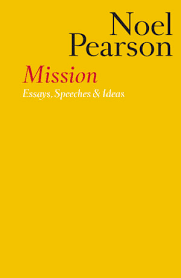
Mission Is a collection of essays, speeches and newspaper articles by the lawyer, activist and founder of the Cape York Institute whom I have long held in greater respect than any other Indigenous leader. The book confirmed that respect, though I may have been influenced in that conclusion by the fact that I found myself agreeing with the author’s opinions on most subjects.
It is a long book, running to 600 pages, and I must confess to finding his speeches and articles easier to read than his much longer essays. That may have been due, not only to their length, but to the unwelcome realisation that Pearson’s intellect is far superior to my own. Indeed, I couldn’t help wondering if he made a conscious effort to demonstrate that superiority.
There is much repetition of ideas in the various components of the book, and to me three stood out as fundamental. First, Aboriginals and Torres Strait Islanders should strive for equality with non-Indigenous Australians, not special treatment. Second, the availability of welfare since Aboriginals were recognised as Australian citizens in the 1967 referendum has had a disastrous effect on Aboriginal culture; specifically, passive welfare – the grant of money and services without any obligation to work for them – has been responsible for the prevalence of alcohol and other addictions, violence and neglect. And third, the paramount value of education in overcoming disadvantage, for which parents, as well as as governments and educational authorities, however well-meaning, must take personal responsibility.
Pearson convincingly argues that our concept of multiculturalism is over-simplified, pointing out that, within each ‘culture’, there are many layers which contribute to one’s identity. That prompted me to indulge in a rare bout of introspection, and the realisation that my ancestry (or heritage),upbringing, language, education, career, citizenship (and allegiance), sexual orientation and membership of a local community all contribute to my self-identity.
With professed reluctance, Pearson cites the extinction (the most neutral of the several descriptors he employs) of full-blooded Aboriginals in Tasmania as an unavoidable precursor to the recent demands for reconciliation in the form of constitutional recognition of Indigenous Australians. In this context he describes colonists’ perception of Aboriginals as “inferior beings of human likeness” – a chilling phrase which long lingered in my consciousness.
He draws an important distinction between integration and assimilation, maintaining that Indigenous Australians have not been allowed to make their own choices about – that is, take responsibility for – how to reconcile their cultures with the demands of development. “We need the right constitutional ‘hook’ for our people to … take back liberty and responsibility.” He regrets the change made to our constitution following the 1967 referendum, based on a racial distinction between Indigenous and non-Indigenous Australians, and urges the removal of that distinction, maintaining that we are all members of the same race – the human race.
Pearson points out that the fact that Aboriginals represent an extreme minority (3%) of the Australian population, scattered across the continent, means feeble democratic representation at best, exclusion at worst. In a 2014 essay, he made the case for recognition of Indigenous Australians in our constitution – not as symbolism, but to address the problem of Indigenous powerlessness and voicelessness by means of active representation. The following year he suggested this might be achieved through various means, including reserved seats in parliament, a treaty, or some form of representative body – anticipating the 2017 Indigenous Convention at Uluru.
The Statement from the Heart, which emanated from that convention, filled Pearson with optimism. He saw it as enshrining the principle enunciated throughout the book – that Indigenous Australians should take responsibility for their own affairs. His optimism was shattered by then Prime Minister Malcolm Turnbull’s rejection of the Statement, and he makes no attempt to disguise his detestation of Turnbull, who he sees as reversing his previous position on reconciliation.
Although the book was published in late 2021, most of his speeches recorded in it were delivered in the first decade of this century, and it is alarming how little progress (if any) has been made in the intervening years. I have long regretted Pearson’s decision not to enter politics, and it seems that, in his late 50s, he is himself beginning to question that decision. It is intriguing to speculate which party Pearson would seek to join if he did enter politics. In his early days as an activist, he would have been widely considered to be leaning towards Labor, a view which might still appear to be supported by his effusive praise of Gough Whitlam and Paul Keating, crediting the former as responsible for the Racial Discrimination Act 1975 and the latter for the Native Title Act 1993. But his disillusion with the Labor Party since 1996 leaves no doubt as to his hostility to the Left’s approach to Indigenous affairs. He claims that Left and Right share “the common ground of mutual racism”, and his expressed preference for the “radical centre” gives us our only insight into his current political disposition.
I only wish that, however belatedly, Pearson would take the plunge to try “the political path to power inside the tent”, and the opportunity to put his ideas into practice. My expectations may be unrealistic but, If any Indigenous leader has any chance of succeeding where so many have failed, surely that leader is Pearson.
Tony Barnett